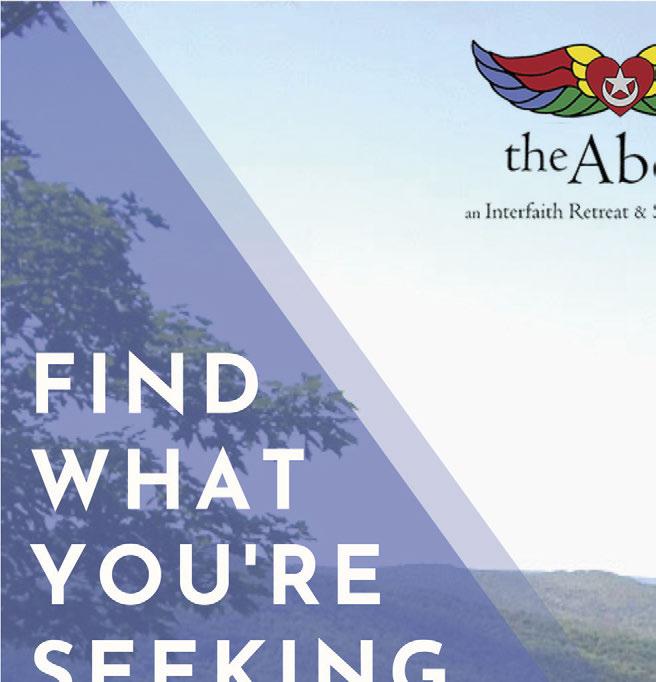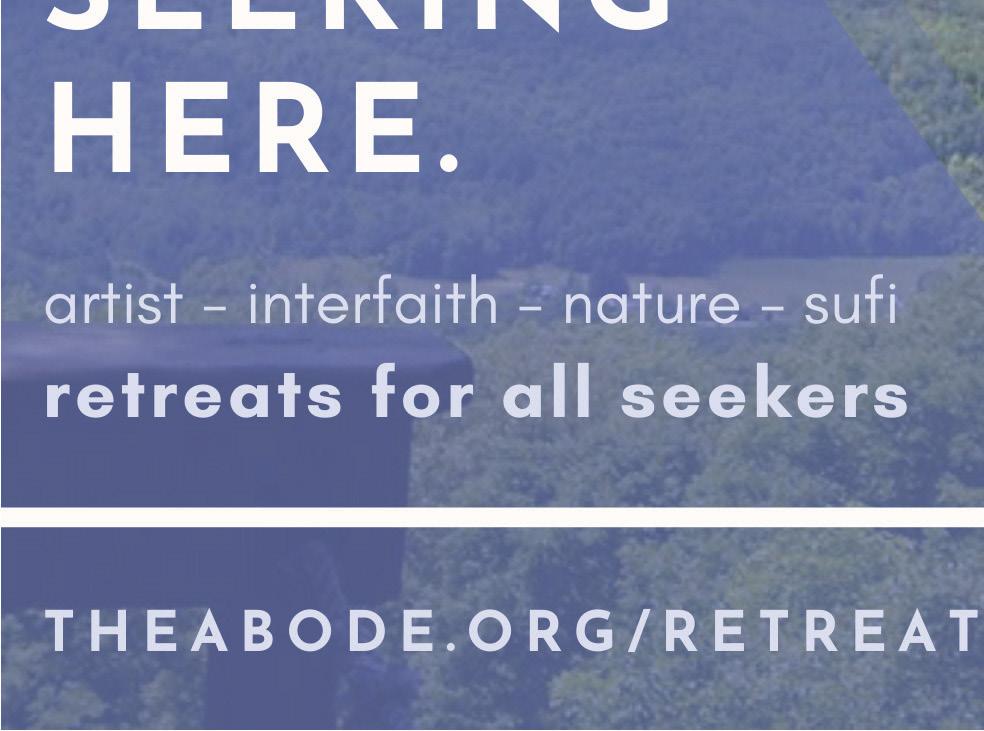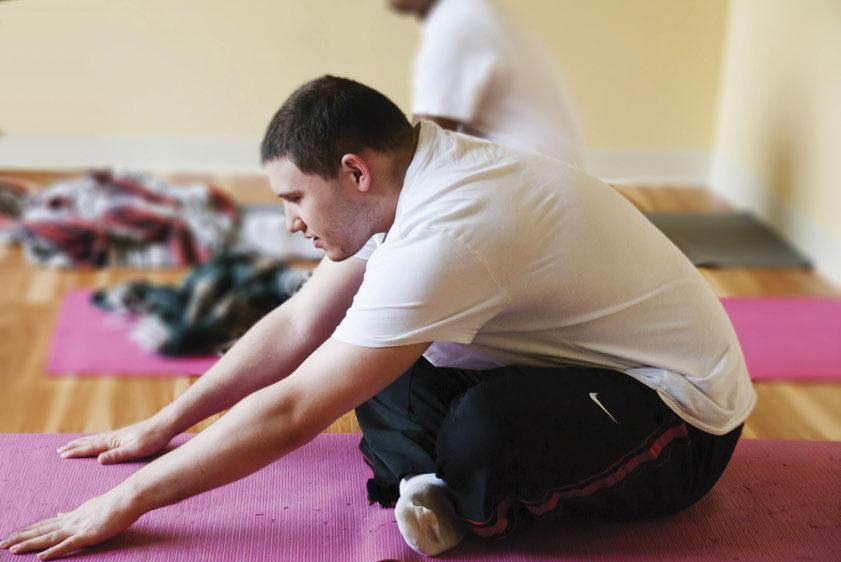
10 minute read
Health & Wellness
by Chronogram
Nurses Rebecca Blackwell-Hafner, Daniel Frisina, and Julie Forgit at Vassar Brothers Medical Center, wearing masks made by Karina Cousineau and volunteer sewers.
PRACTICING KINDFULNESS NOW IS THE TIME TO BE A KINDNESS SUPER-SPREADER. By Wendy Kagan
Advertisement
When Karina Cousineau worked in the corporate fashion industry many years ago, she found it to be an unkind place. “It didn’t really embrace women. Instead it pressured them to be a certain size,” she recalls. “I found myself sad a lot.” She left and thought she’d quit fashion for good. But then she started sewing dresses for herself—dresses that were comfortable, easy, figure flattering, and joyful— and her friends began to ask for a “Karina dress” too. Fast-forward 12 years later and she found herself with a manufacturing operation and storefront in Kingston, a love-tribe following, and a vision to create frocks that embody positivity. Then COVID-19 struck and, in March, the country hit the pause button. That’s when Cousineau pivoted away from dresses and threw her energy into something critically needed: face masks for essential workers.
By late June, with the help of about 40 volunteer sewers and a GoFundMe campaign, she had made and distributed 10,000 masks to hospitals, senior living and hospice facilities, local grocery stores, women’s shelters, and even the Navajo Nation in Arizona, where the virus hit hard. “It’s my nature to want to do something,” Cousineau says. She’s volunteered a lot in her life, from preparing meals at the local soup kitchen Angel Food East, to working at Mother Theresa’s organization in Kolkata, India. When she heard about the shortage of personal protective equipment during COVID, everything fell into place. “I had fabric, I had cutters. I found out that you can extend the life of an N95 mask with a cotton Fu-style mask, which fits over the N95 and ties to the back of the head.” She also made flat pleated masks for workers who didn’t wear N95s. It was a full-time operation, but Cousineau didn’t do it alone. “The Hudson Valley is full of generous artists, crafters, and sewers who were at home and wanted to help,” she says. To engage them remotely, she made mask kits filled with cut fabric that people could pick up in front of her store, sew at home, and drop off when complete. “When they came back, they were anxious to sew again. And they always said to me, ‘Thank you for helping me help others.’”
A Good Prescription for Life
It’s an undeniable silver lining that, alongside every pandemic instance of hardship and loss, something else is also asserting itself: a fierce brand of kindness. Helpers are coming out of the woodwork and people are showing up for each other through COVID and the racial justice movement in ways big and small—checking on elders, delivering food, supporting Black-owned businesses, thanking frontline workers. But it’s not just a kumbaya moment and it’s not about collecting brownie points. It’s about something bigger. These kind folks are onto something. You see, kindness is good for us.
We have dozens of studies to prove it. One, published in the journal Neuron in 2002, showed that the act of giving lights up the pleasure centers of the brain. Researchers refer to a helper’s high, which may come from a release of endorphins similar to a runner’s high. In a 2018 study in the Journal of Social Psychology, people who performed small acts of kindness each day for seven days reported greater wellbeing. And when you combine kindness with mindfulness—the practice of being fully present in the moment—even more good stuff happens. A 2018 overview in the Harvard Review of Psychiatry suggests that practicing compassion and loving-kindness meditation may be effective in treating a range of clinical conditions, from depression and anxiety to PTSD and chronic pain. Loving-kindness meditation, called metta in Buddhist circles, is a form of meditation that involves mentally sending kindness and warmth to yourself and others: May you be safe, may you be healthy, may you be joyful, may you be free.
“The scientific research in neuropsychology shows us that when people practice these things in a sustained way—being mindful, having compassion towards others, practicing selfcompassion—you are changing your nervous system,” says Tara Cousineau, a Boston-area psychologist who happens to be the sister-in-law of Karina Cousineau, as well as the author of The Kindness Cure: How the Science of Compassion Can Heal Your Heart and Your World (2018). “You’re actually changing your brain for the good. This neuroplasticity makes you healthier, and it helps you live longer.” Tara Cousineau delved deep into a study of kindness about four years ago, when she was raising two teenage girls amid a succession of public tragedies: the Boston Marathon bombing, the Sandy Hook Elementary School massacre, the movie theater mass shooting in Aurora, Colorado. “It was a dark time and I thought, ‘What happened to kindness?’ I put on my research cap and found that science was proving out all this ancient wisdom. With my book, I wanted to get the word out that kindness is a really good prescription for life.”
In convincing people to be kindness super-spreaders, her mission is to make it feel achievable, not unattainable. “The word compassion is difficult for some people,” she explains. “It’s the Dalai Lama, it’s Mother Theresa, it’s these altruistic heroes who jump in front of trains to save someone’s life. And that’s not really the norm.” In bringing kindness down to earth, Tara Cousineau has developed a language around it. Kindness itself she calls “love in action.” “Kindness is not just about being nice or agreeable, soft or weak. It’s actually a strength that we can cultivate, and it spreads. It can be forceful and lead us to compassionate action.” Activating kindness regularly is like flexing a muscle to keep it strong. That’s where kindfulness comes in, which is “being aware of the present moment, with heart.” Yet, she warns, “You can be mindful and not necessarily compassionate. Even a soldier or a sniper is focused and aware in the present moment. Kindfulness is an orientation and a way of life. It’s being aware as the moment unfolds, not caught in the past or worried about the future, with kindness as the overarching way.”
Then there’s kindsight, which Tara Cousineau describes as “viewing your life experiences with tenderness and understanding.” She’d heard the word used by a yoga teacher years ago, and it resonated with her. “I’m a therapist, and I work with lots of people who’ve had difficulties and traumas in their life that are still very sticky.” Kindsight is a key piece of the puzzle because we need to be kind and accepting toward ourselves if we want to be effective in our kindness to others. “I feel this is so relevant right now, cultivating kindsight, with the dual pandemics we have raging, which are COVID-19 and racism,” she says. “Learning how to be an anti-racist, I recognize that no matter how much I read Alice Walker or Toni Morrison, as a white woman I am part of a system of oppression. I may have struggles and traumas, but I actually have a free pass in a lot of areas in my life, and I can feel guilty about that or I can feel a sense of shame. Cultivating kindsight, we can come to terms with something that might not have been in our perspective or viewpoint, and hold it in a space of kindness and compassion. We need to do that in order to nourish and fortify ourselves to go out in the world and make change.”
Building Up a Positivity Bias
Even without the two pandemics, kindfulness and kindsight are not effortless. They need our active participation in changing our neurobiology. “As human beings, our evolutionary instinct is to be in survival mode,” explains Tara Cousineau. “Our brains are scanning for danger all the time. If we’re constantly exposed to stress, whether that’s paying the bills or listening to the 24-hour news cycle, our mind latches onto these as threats. In psychology, it’s called the negativity bias. That’s where our attention goes, and we get caught in a spell. I call it Self-Protective Empathy Lethargy (SPEL), which is when we’re burnt out and overwhelmed by all the stressors in our lives. Several months into COVID, I think a lot of people feel burned out. But what we’re doing when we practice selfcompassion skills, or compassion for others, is we’re beginning to cultivate a positivity bias, which can offset that very natural negativity bias. We need the negativity bias for survival, but we can’t let it take over.”
SAUGERTIES YOGA



DAILY YOGA OUTSIDE & ONLINE WWW.SAUGERTIESYOGA.COM 845-859-YOGA (9642) JOIN US AUGUST 3-7 & 10-14 FOR YOGA FOR AUTISM 100-HOUR TEACHER TRAINING PROGRAM
While being in a spell can wear us down and leave us overwhelmed and fearful, being mindful, or being kindful, can bring us back to the present moment, with heart. “What am I experiencing, how am I feeling in my body? We can cultivate self-awareness and notice what’s happening,” says Tara Cousineau, “and when we do it with a sense of caring and kindness and tenderness, we can break out of that spell.” In The Kindness Cure, she devotes 28 chapters to 28 skills or practices designed to cultivate kindfulness. The idea is to flex this muscle enough that it becomes second nature.
Step one is learning to be calmer—practicing belly breathing, feeling your feet on the floor, and being mindful for a certain amount of time each day, like when you’re in the car or washing dishes. Next is learning to recognize and label your emotions. She gives COVID as an example: “When someone walks by without a mask, you might feel anger, but if you look closer, underneath is a feeling of fear.” Then, it’s about putting yourself in someone else’s shoes so you don’t get caught in reactivity. “What’s the most generous thing I can say? Can we find common ground? It’s not to let them off hook, but to let them see we are connected.” She also counsels that we titrate how much news we take in (watch the doomscrolling) and actively build up our positivity bias by taking in the good—whether it’s sharing a positive news story or noticing moments of appreciation, beauty, and connection. Another essential step is cultivating our helping behaviors. Volunteering—say, delivering food to people in need, or writing letters to the elderly in nursing homes—has amazing preventative outcomes. “Seniors who volunteer one or two hours a week live longer than seniors who don’t volunteer. And teenagers who volunteer are more resilient and less likely to engage in risky behaviors.”

An essential step of kindfulness is cultivating helping behaviors. Volunteering—say, delivering food to people in need, or writing letters to the elderly in nursing homes—has amazing preventative outcomes.
The Kindness Boomerang Effect
For Tara Cousineau, the story of her sister-in-law Karina’s volunteer maskmaking project exemplifies love in action. “She has this beautiful business making dresses, but with COVID, so many small businesses shut down. No one was shopping and that was really hard. But she just pivoted and said, I have the knowledge and machinery to make 10,000 masks. And others joined her. It was like the sewing circles that happened in wartime, sewing bandages. It was an amazing response.”
Karina Cousineau kept her business afloat with a Paycheck Protection Program (PPP) loan and also leaned on sales through her website. Her store is open again, but business is down 50 to 60 percent. “I’m optimistic we’re going to make it,” she says nonetheless. “We have a lot of loyal customers.” And she doesn’t regret pouring her energy into mask-making for two and a half months at the beginning of the crisis. Seeing workers at her local food co-op wearing masks in her signature polka-dot fabric gives her pleasure. So does the steady stream of thank you messages she has received, including a TikTok video from nurses in the Bronx that still makes her cry. “I think Tara and I both understand that kindness isn’t just for others—it’s also for ourselves, it’s win-win. That’s how giving is. You think, Oh, I’m giving, and the person receiving is benefiting. But what I’ve always found is that I get just as much back. It’s a wonderful thing.”
RESOURCES Tara Cousineau, PhD Taracousineau.com Karina Cousineau Karinadresses.com










